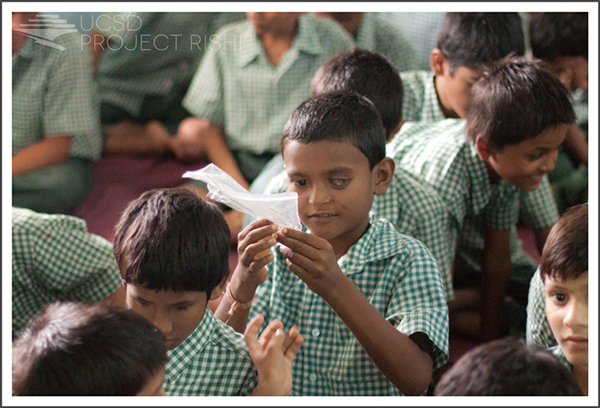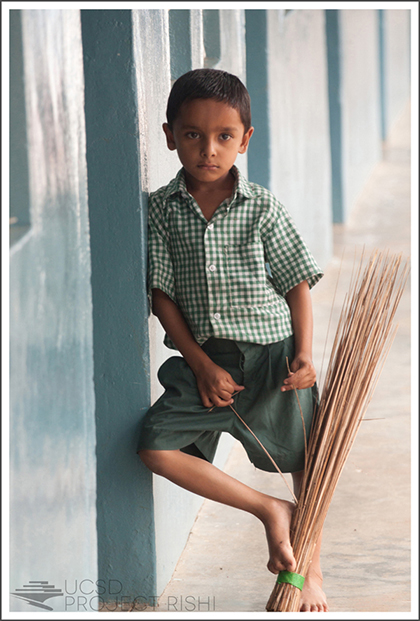Since the chapter’s founding in 2009, UCSD Project RISHI has been working with a village in rural Maharashtra, called Anandwan, Hindi for “Forest of Joy”. Last year, we completed a successful trip to India, where we piloted three components of our health education curriculum, including first aid, nutrition, and hygiene. Through our efforts, we hope to ultimately provide the children with the knowledge to practice behaviors that promote good health and disease prevention, as well as engage students in a social dialogue about health and responsible decision-making. The following images offer a look into Anandwan’s school and the education camps that Project RISHI is implementing.

A deaf student is being taught to associate words with sounds and objects. The teachers of the blind and deaf schools in Anandwan continue to find ways to adapt their curriculum to the unique needs of each child. However, they lack sophisticated resources and models to use in their lessons that keep the disabled children up to speed with their nondisabled counterparts.

Anandwan is a village located in rural Maharashtra, which functions as a rehabilitation site for those that are blind, deaf, mute, and persons afflicted with leprosy. Along with providing basic education to the villagers, Anandwan provides treatment for patients and vocational training for disabled people, so they can support themselves independently and be valued members of society. Leprosy is 100% curable, but the problems that the patients face are socially entrenched. The afflicted are often forced to leave their villages in order to escape the prejudices associated with the disease.

Many of the students in the blind and deaf school share similar social injustices. With a society that is not accepting of their disability, students are placed in boarding schools by their parents so that their families don’t suffer the social consequences of having a disabled child. At Anandwan, this social stigma is left behind, and disabled children are taught to have a strong sense of community and accept one another.

Two blind students are practicing the Heimlich maneuver they learned during the health education camp taught by UCSD Project RISHI members. The schools in Anandwan don’t include health topics as part of their core curriculum, so students lack basic knowledge about general health practice. Our health education camps are designed to provide the children with practical information on topics including first aid, nutrition, and hygiene so they can make educated decisions regarding their own health.

A student hazards a guess of how much milk should be in their diet during a nutrition camp. Interactive lessons take into account the students’ disabilities and allow them to engage the material and learn from each other. The villagers of Anandwan maintain a simple vegetarian diet consisting of lentils, vegetables, and ‘roti’; the only two commodities imported are salt and oil. Through the nutrition camps, the children learn how to create a balanced, healthy diet by associating common farm products with categories in a food pyramid.

A curious student examines his health supply kit, which he earned as a reward for participating in a health education camp activity. The student must rely on touch to discern the contents of the kit and learn how to use them. Our goal is to supply professional tactile models that can be used throughout their health curriculum to introduce concepts such as anatomy and sexual health through a medium that the students find most comfortable.

Project RISHI hopes to empower these children through education. A villager’s greatest asset is considered to be their own health. By teaching the youth preventative health care along with basic first aid, these children will be able to improve the quality of their own lives.
